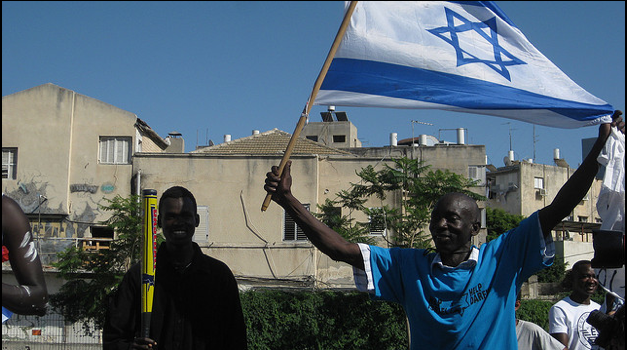
BY DANIELLE BELLA ELLISON
“What does ‘protection’ mean?”
“No fear. No fear of harm.”
“No hardships of war.”
“Prevention from unhumanitarian treatment. Maybe from religion, or race, or political opinion.”
These were the answers of a group of thirteen Sudanese and Eritrean migrants, sitting in their nicest jeans and t-shirts in a classroom Tuesday night in Southern Tel Aviv. My supervisor, Sivan Carmel of Hebrew Immigrant Aid Society (HIAS) Israel, was giving a guest lesson on International Refugee Law to these best students at The Schoolhouse, a program that endeavors to help migrants to Israel develop English language skills and provides educational and vocational guidance.

The Africans in the room were able to express in English their understanding of this dreamed-of condition that drove them out of their countries of origin, through the perilous Sinai, and to Israel. As Sivan explained, protection of a refugee’s life and freedom is mandated by the United Nations 1951 Convention and 1967 Protocol relating to the Status of Refugees. But their ability to debate their futures halted when confronted with more complicated words like “discrimination,” “persecution,” and “prosecution.” I looked around the room at some confused faces and heard some muttered guesses at the meaning of these terms used in key legal documents. One man whispered to another something in his native language, to which the second seemed to disagree.
Confronting the challenges of imperfect and often unenforceable International Refugee and Asylum Law is one task of mine as a summer legal intern for Lawyers Without Borders and HIAS Israel. Particularly in the past six years, and escalating in the past three, the issue of African refugees arriving en masse to Israel has sparked intense debate in Israeli society and politics over how to balance the humanitarian concerns for these people with the political, social, and economic objectives of the State of Israel. At present, these approximately 55,000 Africans are in limbo, and contemporary laws and Court decisions are each week weighing in on what their future will hold.
It struck me that for the hours I will spend pouring over legal documents and Israeli Court decisions, analyzing the claims of refugees and the horrific facts on the ground in their countries of origin, the legal barriers are not the only ones in these people’s way. The language barrier is one that impedes protection as well. Perhaps a person will not be able to properly express his refugee claim, even with interpreters on hand. More broadly, living in Israel with little knowledge of English and virtually none of Hebrew leaves a person – who has already suffered so much hardship – in a condition of ignorance, disorientation, uncertainty, and perhaps even fear.
Danielle Bella Ellison ’15 is in Davenport College. This summer she is blogging from Tel Aviv, Israel. Contact her at danielle.ellison@yale.edu.